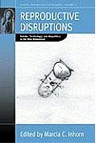Reproductive disruptions, such as infertility, pregnancy loss, adoption, and childhood disability, are among the most distressing experiences in people s lives. Based on research by leading medical anthropologists from around the world, this book examines such issues as local practices detrimental to safe pregnancy and birth; conflicting reproductive goals between women and men; miscommunications between pregnant women and their genetic counselors; cultural anxieties over gamete donation and adoption; the contested meanings of abortion; cultural critiques of hormone replacement therapy; and the globalization of new pharmaceutical and assisted reproductive technologies. This breadth – with its explicit move from the local to the global, from the realm of everyday reproductive practice to international programs and policies – illuminates most effectively the workings of power, the tensions between women s and men s reproductive agency, and various cultural and structural inequalities in reproductive health.
Reproductive Disruptions: Gender, Technology, and Biopolitics in the New Millennium (Fertility, Reproduction and Sexuality)


